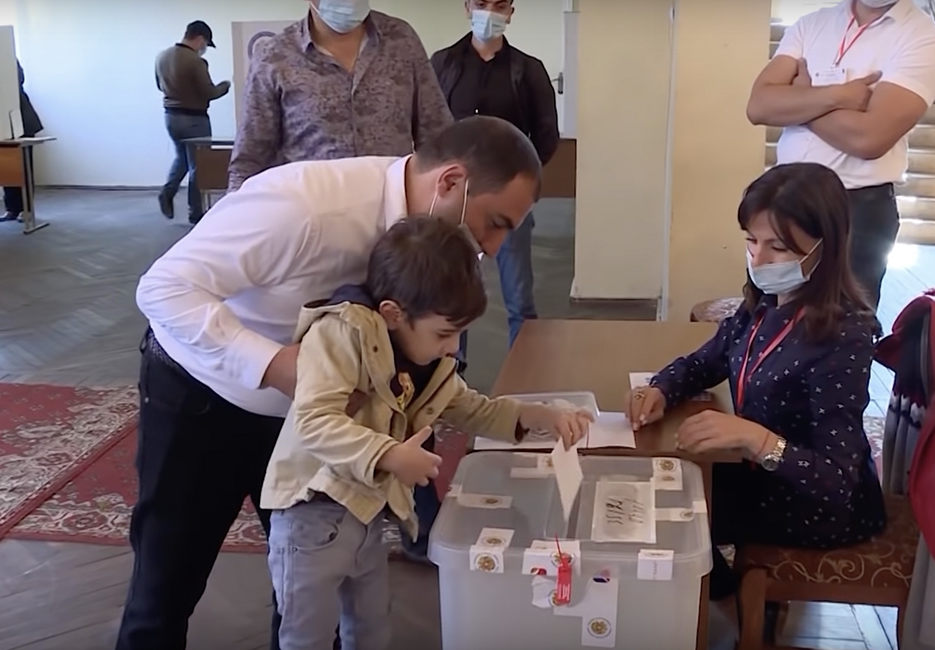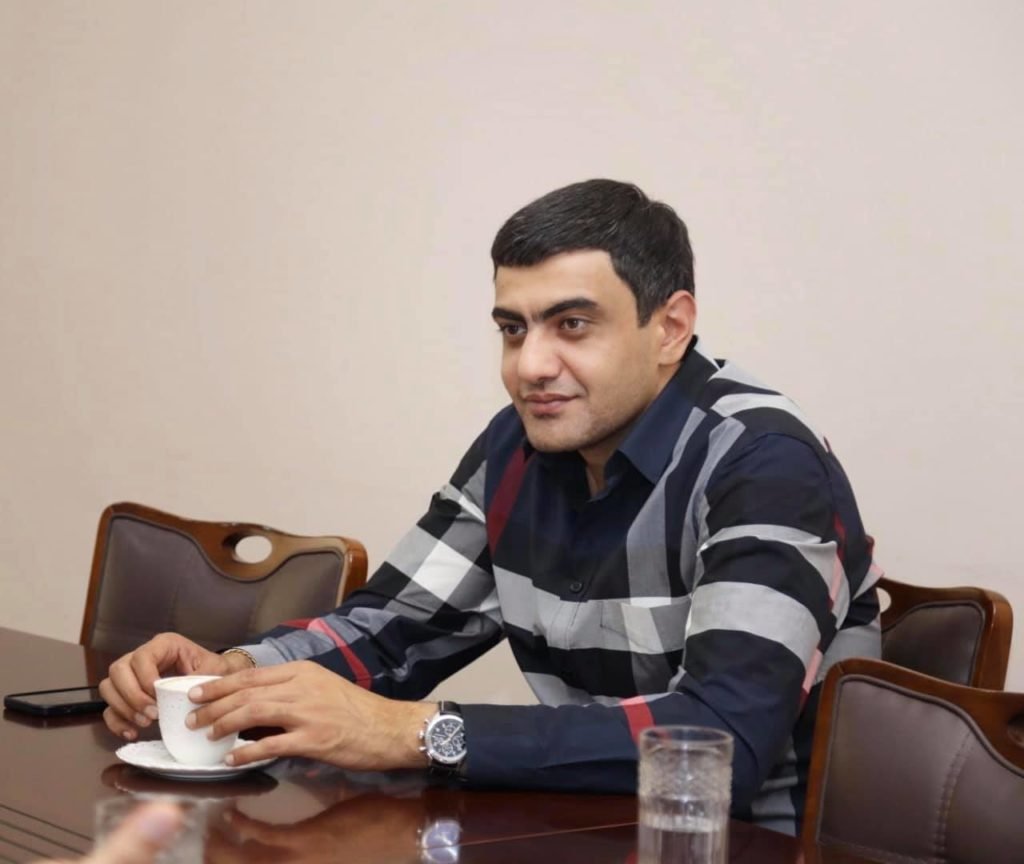
PM Nikol Pashinyan’s ruling Civil Contract Party faced defeats in the limited municipal elections held on October 17.
Elections were held in four major municipalities, including Goris, Meghri, Gyumri and Dilijan, as well as the smaller towns of Tatev and Tegh. The Civil Contract Party suffered setbacks in three out of the four municipalities, where it declared a decisive victory in the June 2021 snap parliamentary elections.
The municipal elections registered a low voter turnout of 33.2-percent, with only 55,410 of 166,753 eligible voters participating nationwide. The low level of participation contrasts with the previous parliamentary elections in June, in which nearly half of eligible voters cast a ballot.
While the Civil Contract Party presented a party roster in every local election, the opposition adopted a less systematic approach, as single parties or opposition-aligned candidates competed in the various elections. Notably, the Armenian Revolutionary Federation (ARF) and the two previous parliamentary opposition factions, the Prosperous Armenia and Bright Armenia parties, which were deposed in June, did not present candidates in any of the elections.

In Goris, Syunik, the bloc aligned with the incumbent mayor Arush Arushanyan swept in the local election, securing about 60-percent of the vote against the Civil Contract Party’s 34-percent. Arushanyan, who participated in the parliamentary elections as an MP with the Armenia Alliance, ran as the head of an electoral slate with his own coalition including the Resurgent Armenia Party.
Resurgent Armenia is led by former governor of Syunik and current MP Vahe Hakobyan. The party is largely composed of community heads from Syunik, who unilaterally blamed Pashinyan for Armenia’s defeat in the 2020 Artsakh War and demanded his resignation in the runup to the snap election.
Arushanyan is presently in pre-trial detention on charges of vote buying during the parliamentary elections. Since he has not yet been convicted of any crimes, he was allowed to participate in the municipal elections. The Armenia Alliance has condemned a series of arrests of its members following the June election as a coordinated crackdown on the new parliamentary opposition.
Police presence was heightened in Goris on the eve of the election. On October 17, police conducted a search of the headquarters of Arushanyan’s bloc, stating that they were seeking evidence of vote buying by Arushanyan’s father and campaign manager Gagik. The Armenia Alliance denounced the search as an illegal attempt to “exert psychological pressure” on the local community, while Arushanyan has denied allegations of vote buying.
“There is a criminal case initiated at the Police Department for Fighting Organized Crime that Gagik Arushanyan bought votes on October 16, 2021. Based on this, the First Instance Court of the city of Yerevan issued a search warrant, so that today, on the day of the election, the police can come and conduct a search,” Arushanyan’s lawyer Armen Melkonyan told reporters. “Now they are waiting to find money here.”
The day after Arushanyan’s reelection, 33 of his supporters were rounded up and detained for questioning by the police.
Independent election observers recorded instances of voter bribery and abuse of administrative resources by the Arush Arushanyan bloc in Goris and the Civil Contract Party in Tegh. While law enforcement has opened a case against Arushanyan’s father, no parallel case has been pursued against the Civil Contract Party.
“We see in the government’s behavior a failure to properly investigate what happened in Tegh, but we see no problem with what they are doing in Goris because we have credible information that vote bribes were distributed in Goris,” said Daniel Ioannisian, who coordinated observers deployed on election day.
In Meghri, Syunik, Aram Sargsyan’s Republic Party won with 42-percent of the vote. The Civil Contract Party came in second with 32-percent. Sargsyan, who has been critical of both the ruling and opposition parties, was previously part of the Yelk Alliance alongside the Civil Contract Party. Following the June elections, he immediately recognized Pashinyan’s victory and expressed his readiness to cooperate with his government.
In Gyumri, Armenia’s second largest city located in the Shirak province, the Civil Contract Party lost to the party of the incumbent mayor Samvel Balasanyan. Balasanyan was elected mayor of Gyumri in 2012 and previously served in parliament as a member of Gagik Tsarukyan’s Prosperous Armenia Party. The electoral slate of the Balasanyan Alliance Socialist Party, headed by Vardges Sanosyan, earned about 36-percent of the vote, as opposed to the Civil Contract Party’s 29-percent.
Out of the four major municipalities to hold elections, Dilijan is the only town in which the Civil Contract Party secured a victory, with nearly 60-percent of the vote.
Armenia Alliance MP Artur Khachatryan said the Civil Contract Party lost in Gyumri, Goris and Meghri because Pashinyan did not personally campaign in these races. “The ruling political force is completely dependent on Pashinyan’s popularity,” he told RFE/RL’s Armenian Service. Khachatryan also said that the ruling party’s defeat testifies to a drop in the prime minister’s ratings. “People’s lives are not getting better,” he said. “On top of that, there is the most important thing: national security considerations.”
The October 17 municipal elections were the first to be held following the passage of a series of reforms in June of 2020. Bill G-567 expanded the closed list system of proportional representation, previously only used in Yerevan, Gyumri and Vanadzor, to all communities with more than 4,000 registered voters. Under the closed list system, voters elect a party slate as opposed to individual candidates. Moreover, the mayor is chosen by the newly-elected city council, rather than through a direct vote.
The system of proportional representation includes a 1-in-3 gender quota for the purpose of increasing women’s participation in local government. Women are severely underrepresented in Armenian politics, including in the executive and legislative branches and local governments. Prior to the October 17 election, municipal councils in over half of the nation’s cities and towns did not include a single woman.
The reforms additionally reduce the electoral threshold to four-percent for political parties and six-percent for coalitions of multiple parties, down from six percent and eight percent, respectively.
Shamiram, Ferik and Fioletovo, which are mainly populated by the Yezidi and Molokan Russian minority communities, also held local elections on October 17. The nation’s remaining municipalities will host elections on November 14 and December 5.



Unity is what is needed. And competency. Two things that are grossly lacking.